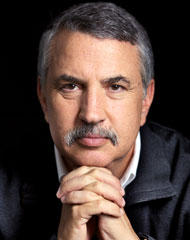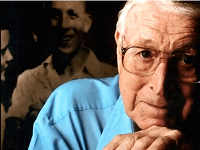history
John Wooden’s Creed for Life
Extraordinary Old Photos
A Theory of Everything (Sort Of) By THOMAS L. FRIEDMAN

LONDON burns. The Arab Spring triggers popular rebellions against autocrats across the Arab world. The Israeli Summer brings 250,000 Israelis into the streets, protesting the lack of affordable housing and the way their country is now dominated by an oligopoly of crony capitalists. From Athens to Barcelona, European town squares are being taken over by young people railing against unemployment and the injustice of yawning income gaps, while the angry Tea Party emerges from nowhere and sets American politics on its head.
What’s going on here?
There are multiple and different reasons for these explosions, but to the extent they might have a common denominator I think it can be found in one of the slogans of Israel’s middle-class uprising: “We are fighting for an accessible future.” Across the world, a lot of middle- and lower-middle-class people now feel that the “future” is out of their grasp, and they are letting their leaders know it.
Why now? It starts with the fact that globalization and the information technology revolution have gone to a whole new level. Thanks to cloud computing, robotics, 3G wireless connectivity, Skype, Facebook, Google, LinkedIn, Twitter, the iPad, and cheap Internet-enabled smartphones, the world has gone from connected to hyper-connected.
This is the single most important trend in the world today. And it is a critical reason why, to get into the middle class now, you have to study harder, work smarter and adapt quicker than ever before. All this technology and globalization are eliminating more and more “routine” work — the sort of work that once sustained a lot of middle-class lifestyles.
The merger of globalization and I.T. is driving huge productivity gains, especially in recessionary times, where employers are finding it easier, cheaper and more necessary than ever to replace labor with machines, computers, robots and talented foreign workers. It used to be that only cheap foreign manual labor was easily available; now cheap foreign genius is easily available. This explains why corporations are getting richer and middle-skilled workers poorer. Good jobs do exist, but they require more education or technical skills. Unemployment today still remains relatively low for people with college degrees. But to get one of those degrees and to leverage it for a good job requires everyone to raise their game. It’s hard.
Think of what The Times reported last February: At little Grinnell College in rural Iowa, with 1,600 students, “nearly one of every 10 applicants being considered for the class of 2015 is from China.” The article noted that dozens of other American colleges and universities are seeing a similar surge as well. And the article added this fact: Half the “applicants from China this year have perfect scores of 800 on the math portion of the SAT.”
Not only does it take more skill to get a good job, but for those who are unable to raise their games, governments no longer can afford generous welfare support or cheap credit to be used to buy a home for nothing down — which created a lot of manual labor in construction and retail. Alas, for the 50 years after World War II, to be a president, mayor, governor or university president meant, more often than not, giving things away to people. Today, it means taking things away from people.
All of this is happening at a time when this same globalization/I.T. revolution enables the globalization of anger, with all of these demonstrations now inspiring each other. Some Israeli protestors carried a sign: “Walk Like an Egyptian.” While these social protests — and their flash-mob, criminal mutations like those in London — are not caused by new technologies per se, they are fueled by them.
This globalization/I.T. revolution is also “super-empowering” individuals, enabling them to challenge hierarchies and traditional authority figures — from business to science to government. It is also enabling the creation of powerful minorities and making governing harder and minority rule easier than ever. See dictionary for: “Tea Party.”
Surely one of the iconic images of this time is the picture of Egypt’s President Hosni Mubarak — for three decades a modern pharaoh — being hauled into court, held in a cage with his two sons and tried for attempting to crush his people’s peaceful demonstrations. Every leader and C.E.O. should reflect on that photo. “The power pyramid is being turned upside down,” said Yaron Ezrahi, an Israeli political theorist.
Dinner at the Marine Corps Museum in Quantico Virginia
General Eisenhower Warned Us
Dear Joe,
General Eisenhower Warned Us
It is a matter of history that when the Supreme Commander of the Allied Forces, General Dwight Eisenhower, found the victims of the death camps he ordered all possible photographs to be taken, and for the German people from surrounding villages to be ushered through the camps and even made to bury the dead.
He did this because he said in words to this effect:
‘Get it all on record now – get the films – get the witnesses -because somewhere down the road of history some bastard will get up and say that this never happened’
This week, the UK debated whether to remove the Holocaust from its school curriculum because it ‘offends’ the Muslim population which claims it never occurred. It is not removed as yet. However, this is a frightening portent of the fear that is gripping the world and how easily each country is giving into it.
Now, more than ever, with Iran, among others, claiming the Holocaust to be ‘a myth’, it is imperative to make sure the world never forgets.
How many years will it be before the attack on the World TradeCenter ‘NEVER HAPPENED’ because it offends some Muslim in the U.S.?
Piss Poor?
Love,
They used to use urine to tan animal skins, so families used to all pee in a pot & then once a day it was taken & sold to the tannery ….. if you had to do this to survive you were “Piss Poor”
But worse than that were the really poor folk who couldn’t even afford to buy a pot . . . they “didn’t have a pot to piss in” & were the lowest of the low.
The next time you are washing your hands and complain because the water temperature isn’t just how you like it, think about how things used to be. Here are some facts about the 1500s:
Most people got married in June because they took their yearly bath in May, and they still smelled pretty good by June. However, since they were starting to smell ….. Brides carried a bouquet of flowers to hide the body odor. Hence the custom today of carrying a bouquet when getting married.
Baths consisted of a big tub filled with hot water. The man of the house had the privilege of the nice clean water, then all the other sons and men, then the women and finally the children. Last of all the babies. By then the water was so dirty you could actually lose someone in it. Hence the saying, “Don’t throw the baby out with the bath water!”
Houses had thatched roofs – thick straw – piled high, with no wood underneath. It was the only place for animals to get warm, so all the cats and other small animals (mice, bugs) lived in the roof. When it rained it became slippery and sometimes the animals would slip and fall off the roof ….. hence the saying “It’s raining cats and dogs.”
There was nothing to stop things from falling into the house. This posed a real problem in the bedroom where bugs and other droppings could mess up your nice clean bed. Hence, a bed with big posts and a sheet hung over the top afforded some protection. That’s how canopy beds came into existence.
The floor was dirt. Only the wealthy had something other than dirt. Hence the saying, “Dirt poor.” The wealthy had slate floors that would get slippery in the winter when wet, so they spread thresh (straw) on floor to help keep their footing. As the winter wore on, they added more thresh until, when you opened the door, it would all start slipping outside. A piece of wood was placed in the entrance-way. Hence: a thresh hold.
(Getting quite an education, aren’t you?)
In those old days, they cooked in the kitchen with a big kettle that always hung over the fire. Every day they lit
the fire and added things to the pot. They ate mostly vegetables and did not get much meat. They would eat the stew for dinner, leaving leftovers in the pot to get cold overnight and then start over the next day. Sometimes stew had food in it that had been there for quite a while. Hence the rhyme: Peas porridge hot, peas porridge cold, peas porridge in the pot nine days old. Sometimes they could obtain pork, which made them feel quite special. When visitors came over, they would hang up their bacon to show off. It was a sign of wealth that a man could, “bring home the bacon.” They would cut off a little to share with guests and would all sit around and chew the fat.
Those with money had plates made of pewter. Food with high acid content caused some of the lead to leach onto the food, causing lead poisoning death. This happened most often with tomatoes, so for the next 400 years or so, tomatoes were considered poisonous.
Bread was divided according to status. Workers got the burnt bottom of the loaf, the family got the middle, and guests got the top, or the upper crust.
Lead cups were used to drink ale or whisky. The combination would sometimes knock the imbibers out for a couple of days. Someone walking along the road would take them for dead and prepare them for burial. They were laid out on the kitchen table for a couple of days and the family would gather around and eat and drink and wait and see if they would wake up. Hence the custom of holding a wake.
England is old and small and the local folks started running out of places to bury people. So they would dig up coffins and would take the bones to a bone-house, and reuse the grave. When reopening these coffins, 1 out of 25 coffins were found to have scratch marks on the inside and they realized they had been burying people alive ….. So they would tie a string on the wrist of the corpse, lead it through the coffin and up through the ground and tie it to a bell. Someone would have to sit out in the graveyard all night (the graveyard shift.) to listen for the bell; thus, someone could be, saved by the bell or was considered a dead ringer.
And that’s the truth ….. Now, whoever said history was boring!!!
Differences Between Jews and Muslims
Love,
Regardless of your feelings about the crisis between Israel and the Palestinians and Arab neighbors, even if you believe there is more culpability on Israel ‘s part, the following two sentences really say it all:
‘If the Arabs put down their weapons today, there would be no more violence. If the Jews put down their weapons today, there would be no more Israel’.
-Benjamin Netanyahu
The Global Islamic population is approximately 1,200,000,000
ONE BILLION TWO HUNDRED MILLION or 20% of the world’s population.
They have received the following Nobel Prizes:
Literature:
1988 – Najib Mahfooz
Peace:
1978 – Mohamed Anwar El-Sadat
1990 – Elias James Corey
1994 – Yaser Arafat:
1999 – Ahmed Zewai
Economics:
(zero)
Physics:
(zero)
Medicine:
1960 – Peter Brian Medawar
1998 – Ferid Mourad
TOTAL: 7 SEVEN
<<<<<<<<<<<<<<<<<<<<<<<<<<<<<<
The Global Jewish population is approximately 14,000,000
FOURTEEN MILLION or about 0.02% of the world’s population.
They have received the following Nobel Prizes:
Literature:
1910 – Paul Heyse
1927 – Henri Bergson
1958 – Boris Pasternak
1966 – Shmuel Yosef Agnon
1966 – Nelly Sachs
1976 – Saul Bellow
1978 – Isaac Bashevis Singer
1981 – Elias Canetti
1987 – Joseph Brodsky
1991 – Nadine Gordimer World
Peace:
1911 – Alfred Fried
1911 – Tobias Michael Carel Asser
1968 – Rene Cassin
1973 – Henry Kissinger
1978 – Menachem Begin
1986 – Elie Wiesel
1994 – Shimon Peres
1994 – Yitzhak Rabin
Physics:
1905 – Adolph Von Baeyer
1906 – Henri Moissan
1907 – Albert Abraham Michelson
1908 – Gabriel Lippmann
1910 – Otto Wallach
1915 – Richard Willstaetter
1918 – Fritz Haber
1921 – Albert Einstein
1922 – Niels Bohr
1925 – James Franck
1925 – Gustav Hertz
1943 – Gustav Stern
1943 – George Charles de Hevesy
1944 – Isidor Issac Rabi
1952 – Felix Bloch
1954 – Max Born
1958 – Igor Tamm
1959 – Emilio Segre
1960 – Donald A. Glaser
1961 – Robert Hofstadter
1961 – Melvin Calvin
1962 – Lev Davidovich Landau
1962 – Max Ferdinand Perutz
1965 – Richard Phillips Feynman
1965 – Julian Schwinger
1969 – Murray Gell-Mann
1971 – Dennis Gabor
1972 – William Howard Stein
1973 – Brian David Josephson
1975 – Benjamin Mottleson
1976 – Burton Richter
1977 – Ilya Prigogine
1978 – Arno Allan Penzias
1978 – Peter L Kapitza
1979 – Stephen Weinberg
1979 – Sheldon Glashow
1979 – Herbert Charles Brown
1980 – Paul Berg
1980 – Walter Gilbert
1981 – Roald Hoffmann
1982 – Aaron Klug
1985 – Albert A. Hauptman
1985 – Jerome Karle
1986 – Dudley R. Herschbach
1988 – Robert Huber
1988 – Leon Lederman
1988 – Melvin Schwartz
1988 – Jack Steinberger
1989 – Sidney Altman
1990 – Jerome Friedman
1992 – Rudolph Marcus
1995 – Martin Perl
2000 – Alan J. Heeger
Economics:
1970 – Paul Anthony Samuelson
1971 – Simon Kuznets
1972 – Kenneth Joseph Arrow
1975 – Leonid Kantorovich
1976 – Milton Friedman
1978 – Herbert A. Simon
1980 – Lawrence Robert Klein
1985 – Franco Modigliani
1987 – Robert M. Solow
1990 – Harry Markowitz
1990 – Merton Miller
1992 – Gary Becker
1993 – Robert Fogel
Medicine:
1908 – Elie Metchnikoff
1908 – Paul Erlich
1914 – Robert Barany
1922 – Otto Meyerhof
1930 – Karl Landsteiner
1931 – Otto Warburg
1936 – Otto Loewi
1944 – Joseph Erlanger
1944 – Herb ert Spencer Gasser
1945 – Ernst Boris Chain
1946 – Hermann Joseph Muller
1950 – Tadeus Reichstein
1952 – Selman Abraham Waksman
1953 – Hans Krebs
1953 – Fritz Albert Lipmann
1958 – Joshua Lederberg
1959 – Arthur Kornberg
1964 – Konrad Bloch
1965 – Francois Jacob
1965 – Andre Lwoff
1967 – George Wald
1968 – Marshall W. Nirenberg
1969 – Salvador Luria
1970 – Julius Axelrod
1970 – Sir Bernard Katz
1972 – Gerald Maurice Edelman
1975 – Howard Martin Temin
1976 – Baruch S. Blumberg
1977 – Roselyn Sussman Yalow
1978 – Daniel Nathans
1980 – Baruj Benacerraf
1984 – Cesar Milstein
1985 – Michael Stuart Brown
1985 – Joseph L. Goldstein
1986 – Stanley Cohen [& Rita Levi-Montalcini]
1988 – Gertrude Elion
1989 – Harold Varmus
1991 – Erwin Neher
1991 – Bert Sakmann
1993 – Richard J. Roberts
1993 – Phillip Sharp
1994 – Alfred Gilman
1995 – Edward B. Lewis
TOTAL: 129 ONE HUNDRED TWENTY NINE
The Jews are NOT promoting brain washing children in military training camps, teaching them how to blow themselves up and cause maximum deaths of Jews and other non Muslims!
The Jews don’t hijack planes, nor kill athletes at the Olympics, or blow themselves up in German restaurants. There is NOT one single Jew that has destroyed a church. There is NOT a single Jew that protests by killing people.
The Jews don’t traffic slaves, nor have leaders calling for Jihad and death to all the Infidels.
Perhaps the world’s Muslims should consider investing more in standard education and less in blaming the Jews for all their problems.
Muslims must ask ‘what can they do for humankind’ before they demand that humankind respects them!!
63 Years Later
She also had a dog in the back that she trained to bark when the Nazi soldiers let her in and out of the ghetto. The soldiers of course wanted nothing to do with the dog and the barking covered the kids/infants noises … During her time of doing this, she managed to smuggle out and save 2500 kids/infants. She was caught, and the Nazi’s broke both her legs, arms and beat her severely. Irena kept a record of the names of all the kids she smuggled out and kept them in a glass jar, buried under a tree in her back yard. After the war, she tried to locate any parents that may have survived it and reunited the family. Most had been gassed. Those kids she helped got placed into foster family homes or adopted.
Old Model T
Dear Joe,
This is a great video showing the first assembly lines at the original Ford auto plant. Neat to see those guys making the old wooden wheels, by hand mostly.
Love,
Dad









